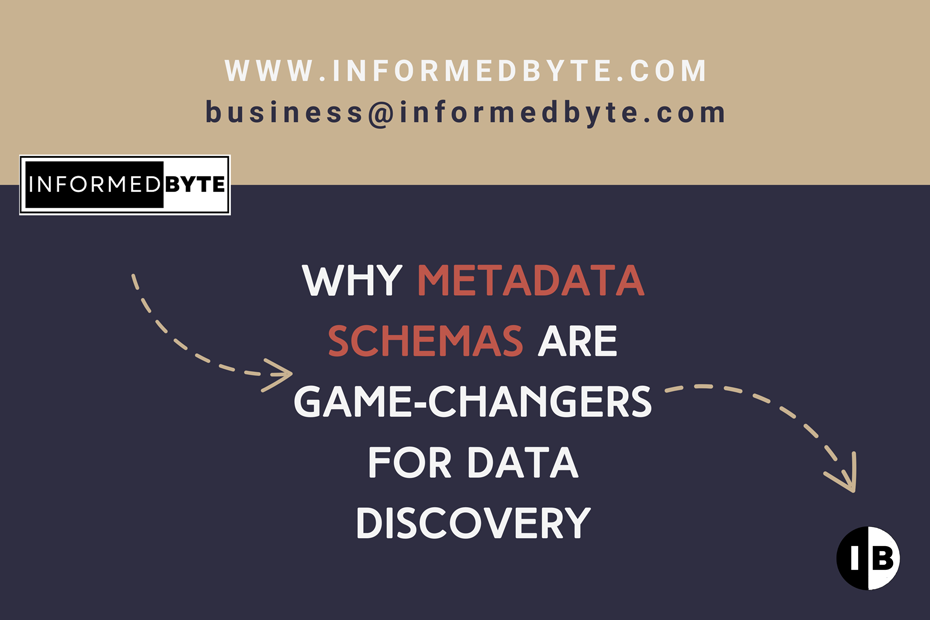Why Metadata Schemas Are Game Changers for Data Discovery
July 29, 2025
The importance of metadata schemas within information management cannot be overstated. As organisations grapple with ever-increasing volumes of data, the ability to efficiently discover, manage, and share this data has become a critical competitive advantage. Metadata schemas, often overlooked, are secret game changers for information management and findability. Metadata schemas are revolutionising data discovery and it’s time you leveraged them to unlock the full potential of organisational data.

Image credit by Markus Winkler on Unsplash
Understanding Metadata Schemas
At its core, metadata is data about data. It provides context, meaning, and structure to raw data, making it easier to understand and use. A metadata schema is a structured framework that defines the types of metadata that should be captured and how they should be organised. This framework can include elements such as titles, descriptions, keywords, and relationships between data elements.
Enhancing Data Discovery
One of the primary benefits of metadata schemas is their ability to enhance data discovery. In a scenario where data is scattered across various systems and formats, finding relevant information can be like searching for a needle in a haystack. Metadata schemas provide a standardised way to describe data, making it easier to locate and retrieve. By implementing a robust metadata schema, organisations can ensure that their data is easily searchable and accessible, saving valuable time and resources.
Improving Data Quality
Data quality is a perennial challenge for organisations. Inconsistent or incomplete data can lead to erroneous conclusions and poor decision-making. Metadata schemas play a crucial role in improving data quality by enforcing consistency and standardisation. By defining clear guidelines for how data should be described and categorised, metadata schemas help ensure that data is accurate, complete, and reliable. This, in turn, enhances the overall integrity of the data and boosts confidence in its use.
Facilitating Data Integration
For an interconnected view, data integration is essential for gaining a holistic view of organisational information. However, integrating data from disparate sources can be a complex and time-consuming process. Metadata schemas simplify this process by providing a common language for describing data. This common language enables seamless integration of data from different systems, allowing organisations to create a unified view of their data assets. As a result, metadata schemas facilitate more efficient data integration and enable better decision-making.
Supporting Data Governance
Effective data governance is critical for ensuring that data is managed responsibly and used ethically. Metadata schemas are a key component of data governance frameworks, providing the structure and standards needed to manage data effectively. By defining how data should be described, classified, and managed, metadata schemas help organisations maintain control over their data assets. This, in turn, supports compliance with regulatory requirements and promotes transparency and accountability in data management practices.
Enabling Advanced Analytics
The rise of advanced analytics and artificial intelligence (AI) has opened up new possibilities for extracting insights from data. However, these technologies rely on high-quality, well-organised data to deliver accurate results. Metadata schemas play a vital role in enabling advanced analytics by providing the necessary context and structure for data analysis. By ensuring that data is properly described and categorised, metadata schemas make it easier for analytics tools to process and interpret the data. This, in turn, enables organisations to leverage advanced analytics to gain deeper insights and drive innovation.
Enhancing Collaboration
Collaboration is essential for driving innovation and achieving organisational goals. However, effective collaboration requires easy access to relevant data. Metadata schemas enhance collaboration by making data more discoverable and accessible. By providing a standardised way to describe and organise data, metadata schemas enable team members to quickly find the information they need. This, in turn, fosters a culture of collaboration and knowledge sharing, driving organisational success.
Conclusion
Metadata schemas are game changers for data discovery. By providing a structured framework for describing and organising data, they enhance data discovery, improve data quality, facilitate data integration, support data governance, enable advanced analytics, and enhance collaboration. As organisations continue to navigate the complexities of the data-driven world, metadata schemas will play an increasingly important role in unlocking the full potential of their data assets. Embracing metadata schemas is not just a best practice; it is a strategic imperative for any organisation seeking to thrive in the digital age.
Take action
Book in a free initial consultation with Informed Byte to begin a collaborative Metadata partnership.
Ready for game changing?
